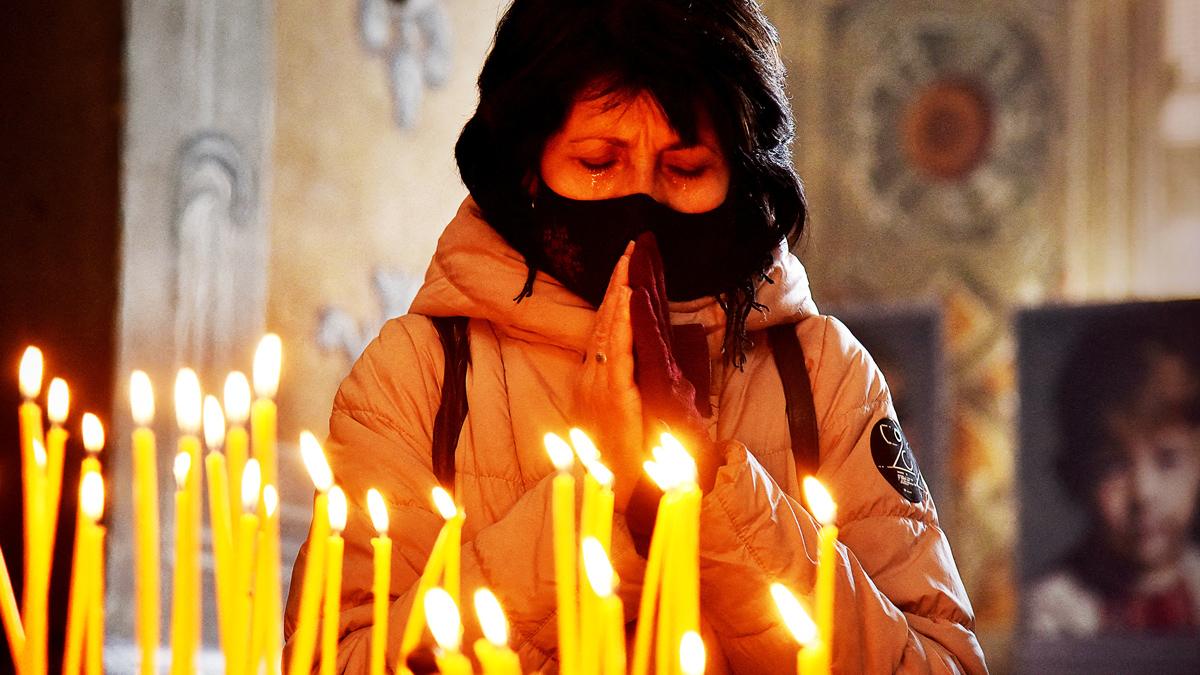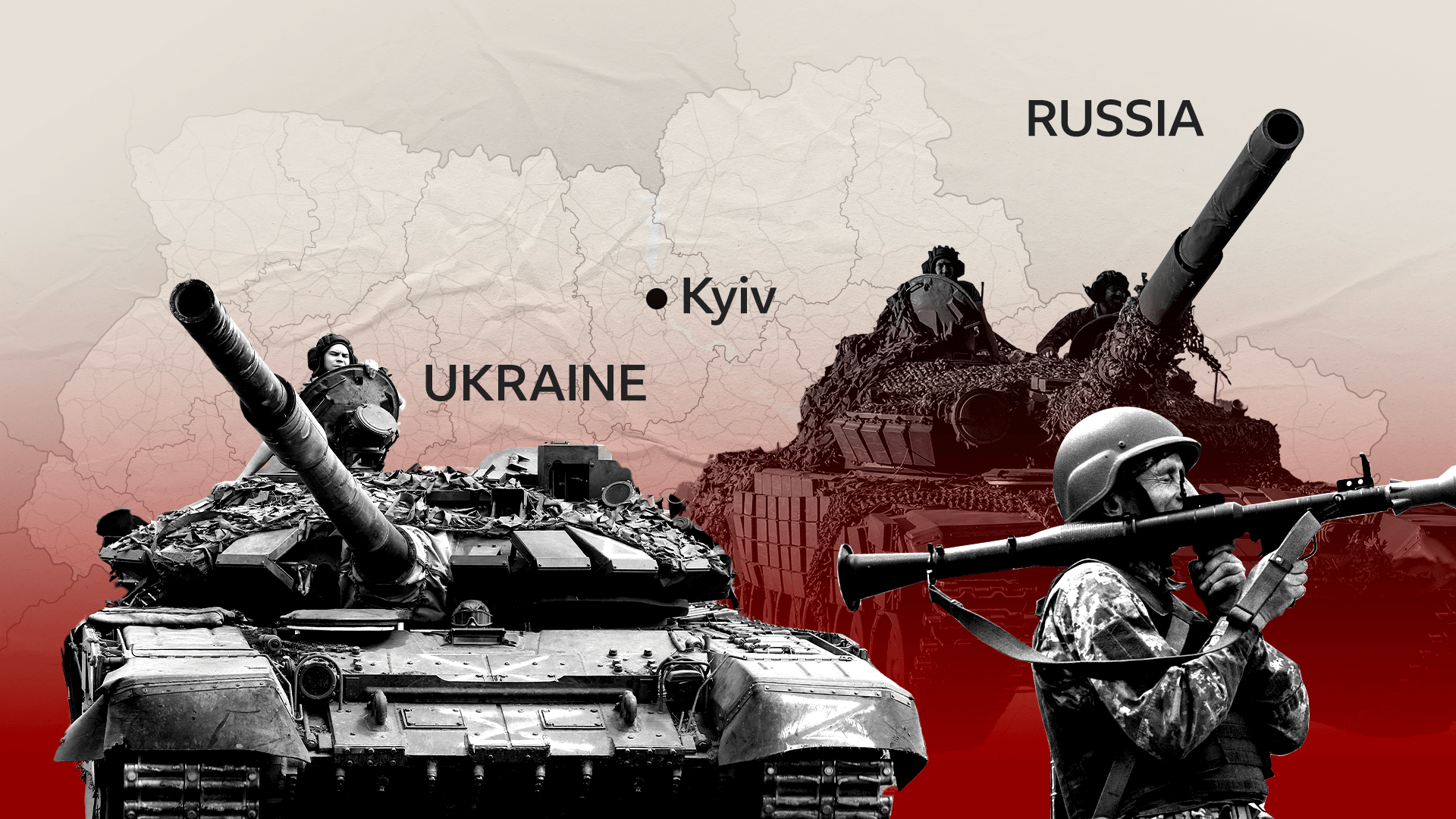Russia transfers thousands of Mariupol civilians to its territory
- Published
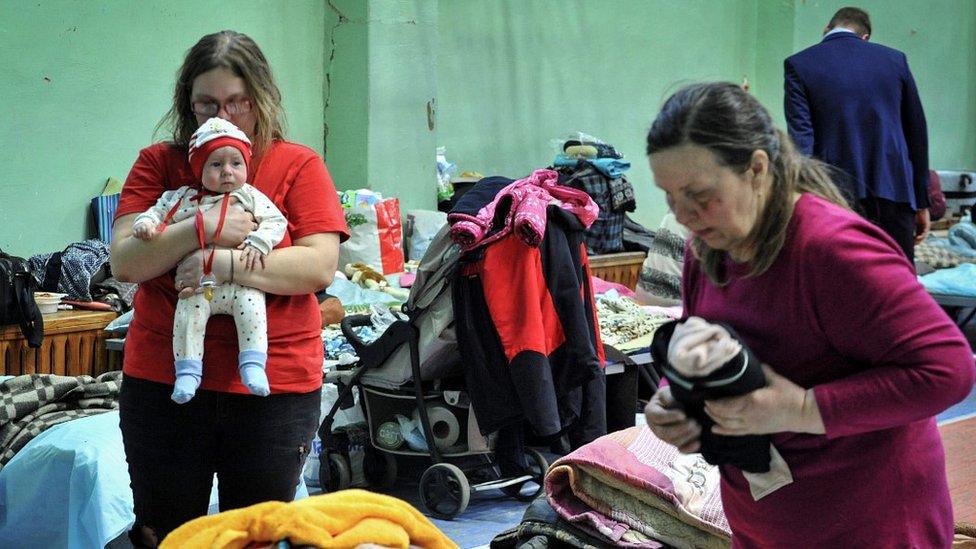
Dozens of refugees are now housed in a sports centre in Taganrog, Russia, east of Mariupol
Ukraine has accused Russia of forcibly relocating thousands of civilians from Mariupol, the strategic port city devastated by Russian shelling.
Russia is housing an estimated 5,000 at a temporary camp in Bezimenne, east of Mariupol, seen in satellite images.
Ukraine's Deputy Prime Minister Iryna Vereshchuk said 40,000 had been moved from Ukraine to Russian-held territory without any coordination with Kyiv.
A Mariupol refugee, now in Russia, said: "All of us were taken forcibly".
Some Ukrainian officials describe Russia's actions as "deportations" to "filtration camps" - an echo of Russia's war in Chechnya, when thousands of Chechens were brutally interrogated in makeshift camps and many disappeared.
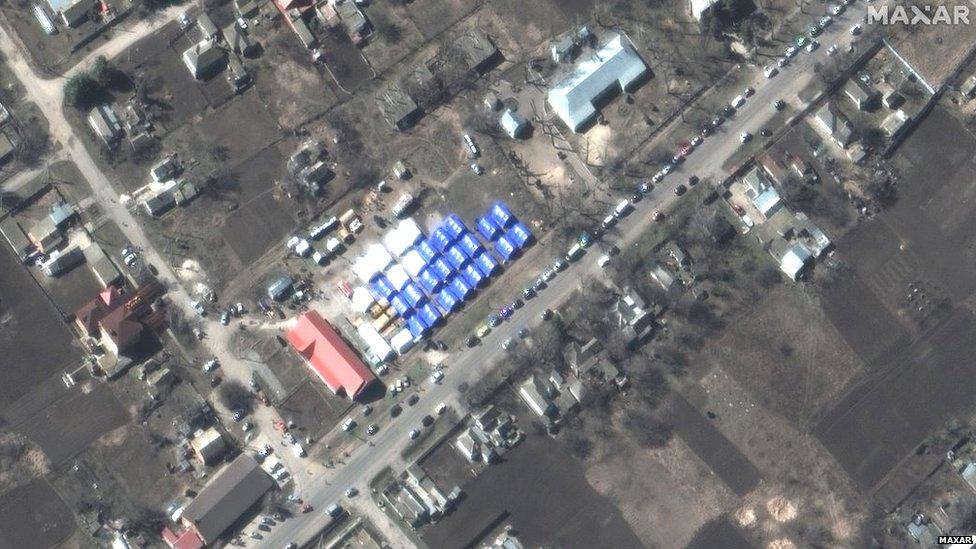
Tents and a long line of cars at Russia's Bezimenne camp for Mariupol refugees on 22 March
It is an internationally-recognised abuse of human rights for a warring party to deport civilians to its territory.
While 140,000 civilians have managed to escape from besieged Mariupol, another 170,000 are still trapped there, the city council says. Relentless Russian shelling for more than three weeks has reduced the city to ruins, its terrified civilians hiding in cellars, desperately short of water, food and medicine.
The BBC is unable to independently verify the figures for civilians evacuated from Mariupol, or the number killed there.
Relatively few Mariupol civilians have fled via the humanitarian corridors agreed by both sides. Ukraine says Russian troops continued shelling the evacuation routes, which were supposed to be safe.
In parts of Mariupol captured by the Russians, reports suggest the civilians - hungry, thirsty and often sick - have little choice but to head out to Russian-controlled areas and Russia itself.
Matt Morris, spokesperson for the International Committee of the Red Cross (ICRC), said the ICRC could only evacuate civilians and deliver aid if Russia and Ukraine provided safety guarantees, and that had not happened yet, though the ICRC was speaking to both sides.
"The sides have to be the guarantors and have an agreement to allow safe passage. They have to publicise the route and allow plenty of time for people to get out," he told the BBC.
International humanitarian law, he said, "requires that people should be allowed to leave, but should not be forced to leave". Warring sides should allow aid in and let people stay if they want to, he explained.
"It's a desperate situation in Mariupol - we've called on all sides to facilitate safe access in and out," he said, adding: "We don't have a team currently able to access."
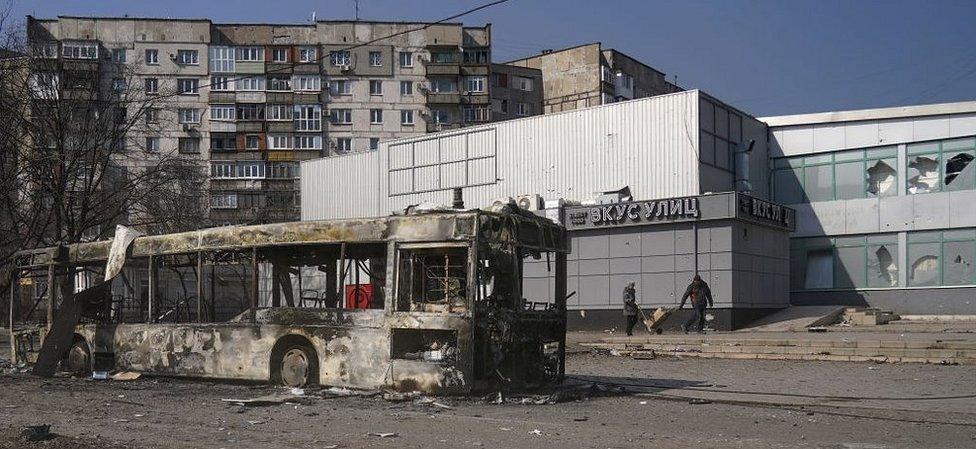
The unremitting Russian bombardment has devastated Mariupol
Irina, a Mariupol refugee and Red Cross volunteer, spoke to the BBC's Wyre Davies via Zoom from a relative's home in Russia.
She said she and others sheltering in a bunker had been told to leave by Russian soldiers, for their own safety. The building was on fire after being shelled.
They walked 4km (2.5 miles) to a Russian checkpoint, and from there were taken further east, to territory held by pro-Russian rebels of the so-called "Donetsk People's Republic" (DPR) breakaway region.
"Once there, you were to decide whether you were going to stay in the DPR or go to Russia," she said.
"Some elderly people that I know and whom I met at the distribution point did not know where they were headed and what for. They thought they would be able to stay in Rostov [in Russia] for a couple of months… and then maybe come back to Mariupol.
"Instead, they were taken to Samara [north of Rostov, in southern Russia]. They said they had no idea what to do there, and the accommodation there is provided only for two weeks."
Centuries-old ties between Russia and Ukraine mean that many Ukrainians have relatives in Russia. But it is not clear how many Mariupol refugees have gone willingly to Russia, whose army destroyed their city.


Russia's government newspaper Rossiiskaya Gazeta reported on 21 March that a long column of refugees' vehicles had taken more than two hours to reach Bezimenne, a coastal village 90km (56 miles) east of Mariupol. About 5,000 refugees are being housed there, in tents, a school and a club. The Russian emergencies ministry has sent aid and workers to the scene.
On the way, the civilians were stopped by DPR rebels at checkpoints, who took their fingerprints and photographed them.
"Their data is checked on a database of wanted criminals. One of the key problems is the shortage of sim cards and not everyone has a mobile phone," the newspaper reported.
Russia denies it is forcibly removing thousands of Ukrainians from their country.
Mariupol's deputy mayor Serhiy Orlov told the BBC that in his city "some are dying from dehydration and lack of food; some are dying from lack of medicine, insulin". Many bodies have been left lying in the streets, as collecting them is so risky.
"Russian soldiers just open [enter] this shelter and tell them: 'look, you have five minutes to evacuate in this direction. Just go, walk five or three or seven kilometres and the buses will transfer you to temporarily controlled territory [by Russia]. If you don't go this house will be bombed in an hour'," he said.
Dozens of Mariupol refugees are staying in a sports centre in Taganrog, a Russian city between Mariupol and Rostov.
Russian media report that hundreds have also been sent by train more than 1,000km (600 miles) north to the Russian regions of Yaroslavl and Ryazan.
Ukraine's defence ministry says Russia is relocating Ukrainians from occupied areas en masse to distant parts of Russia, including Sakhalin in the far east.
"After passing the filtration camps Ukrainians are sent to economically depressive areas of the Russian Federation. A number of northern regions are called as a final destination, in particular - Sakhalin. Ukrainians are 'offered' official employment through employment centres. Those who agree receive documents banning leaving Russian regions for two years," the ministry said on Facebook.
Ukraine has urged the ICRC not to open an office in Rostov-on-Don - something reportedly under discussion with the Russian Red Cross. Ukraine says it could be used to legitimise deportations.
But the ICRC insisted it "does not want to open an office in southern Russia to 'filter' Ukrainians, as many reports are alleging". "This is not our role, we don't do this. We are not opening a refugee camp."
The ICRC says it "does not ever help organise or carry out forced evacuations", and has only helped in two evacuations so far - from Sumy, a besieged city in the north, to other Ukrainian-held territory.
"We would not support any operation that would go against people's will and our principles," the ICRC said.
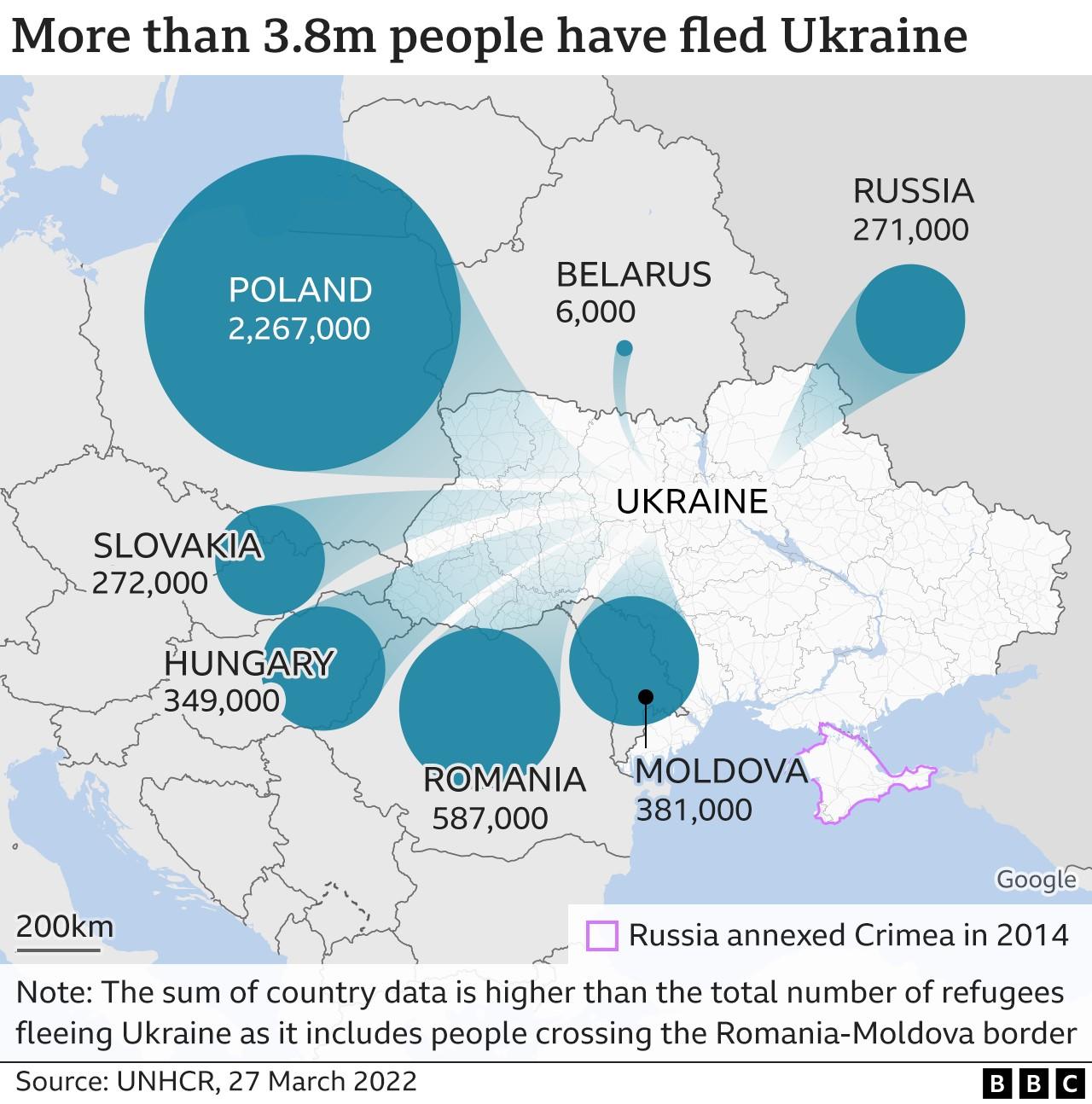

War in Ukraine: More coverage
LIVE: Latest updates from Ukraine and reaction to Biden's speech, external
FACT OR PARANOIA: Red lights fuel fear of Russian agents
UK VOLUNTEERS: The British ex-squaddies heading to Lviv
READ MORE: Full coverage of the crisis, external

Related topics
- Published14 March 2022
